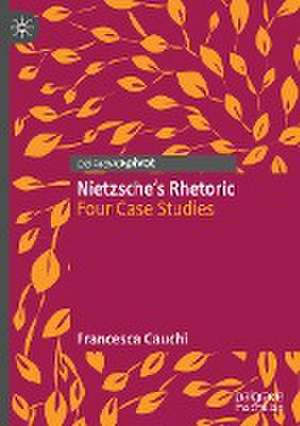Nietzsche's Rhetoric: Four Case Studies
Autor Francesca Cauchien Limba Engleză Hardback – 28 oct 2023
Preț: 317.30 lei
Nou
Puncte Express: 476
Preț estimativ în valută:
60.72€ • 63.16$ • 50.13£
60.72€ • 63.16$ • 50.13£
Carte tipărită la comandă
Livrare economică 14-28 aprilie
Preluare comenzi: 021 569.72.76
Specificații
ISBN-13: 9783031429637
ISBN-10: 303142963X
Ilustrații: X, 122 p.
Dimensiuni: 148 x 210 mm
Greutate: 0.31 kg
Ediția:1st ed. 2023
Editura: Springer Nature Switzerland
Colecția Palgrave Macmillan
Locul publicării:Cham, Switzerland
ISBN-10: 303142963X
Ilustrații: X, 122 p.
Dimensiuni: 148 x 210 mm
Greutate: 0.31 kg
Ediția:1st ed. 2023
Editura: Springer Nature Switzerland
Colecția Palgrave Macmillan
Locul publicării:Cham, Switzerland
Cuprins
1: Introduction.- 2: ‘On Truth and Lies in a Non-Moral Sense’ (1873): Gnats, Spiders, Bees and not so Clever Beasts.- 3: Daybreak (1881): Nietzsche’s Extensive Rhetorical Arsenal.- 4: Beyond Good and Evil (1886): The Rank Odour of Rank Order.- 5: Twilight of the Idols (1888): Magnanimity, Restraint and Tomfoolery.
Notă biografică
Francesca Cauchi is an Associate Professor at National Sun Yat-sen University in Taiwan. She is the author of two books on Friedrich Nietzsche's Thus Spoke Zarathustra, and her work on Nietzsche has appeared in scholarly journals such as Nietzsche-Studien, Oxford German Studies, and Philological Quarterly.
Textul de pe ultima copertă
This book excavates the rhetorical devices that Nietzsche habitually uses and demonstrates how they circumscribe rather than expand the reader’s interpretive horizon. Through a sustained analysis of Nietzsche’s rhetorical style, stratagems, and didactic aims in two of his early works (‘On Truth and Lies in a Non-Moral Sense’ and Daybreak) and two of his later works (Beyond Good and Evil and Twilight of the Idols), the book assesses the extent to which Nietzsche’s substantial
rhetorical arsenal undermines the philosophical claims he is seeking to advance. The four case studies also bring to the fore some of the less palatable aspects of Nietzsche’s thought such as racial stereotyping, the essentialising of a so-called slave mentality, and the ranking of human beings based on a highly idiosyncraticand prejudiced view of what qualifies as noble and ignoble.
Caracteristici
Provides an in-depth, text-specific examination of Nietzsche’s rhetorical style, devices, and strategies Offers a primer on Nietzsche’s highly idiosyncratic style of argumentation Demonstrates a number of ways rhetorical and writing style can function as forms of philosophical argumentation
